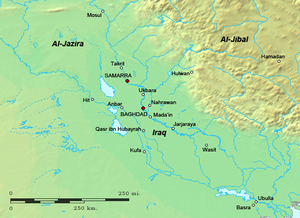Caliphal Civil War (865–866)
| Abbasid civil war (865-866) | |||||||
|---|---|---|---|---|---|---|---|
| Part of the "Anarchy at Samarra" | |||||||
 Map of Iraq and surrounding regions in the mid-ninth century. |
|||||||
|
|||||||
| Belligerents | |||||||
| Al-Mu'tazz (Samarra) | Al-Musta'in (Baghdad) | ||||||
| Commanders and leaders | |||||||
|
Abu Ahmad al-Muwaffaq, Kalbatikin al-Turki, Muhammad b. Rashid al-Maghribi |
Muhammad b. 'Abdallah, Wasif, Bugha al-Sharabi, Abu 'l-Saj Dewdad |
||||||
| Strength | |||||||
| At least 19,000 | Unknown | ||||||
The Abbasid civil war of 865–866, sometimes known as the Fifth Fitna, was an armed conflict during the "Anarchy at Samarra" between the rival caliphs al-Musta'in and al-Mu'tazz, fought to determine who would gain control over the Abbasid Caliphate. The war, which lasted for about a year, largely revolved around a prolonged siege of Baghdad and ended with al-Mu'tazz as sole caliph. Al-Musta'in was abandoned by his supporters and forced to abdicate; in spite of a guarantee that his life would be spared, he was executed shortly afterward.
The outcome of the war was a major victory for the Turkish military establishment, which had been responsible for al-Mu'tazz's rise to power, and allowed the Turks to maintain their effective power over the government and military of the caliphate. The partisans of al-Musta'in, namely the Tahirid family, the Arab military factions, and the citizens of Baghdad, continued to be excluded from the politics of the central government after their surrender, although they were allowed to keep the positions they had before the war. Central Iraq, where most of the fighting took place, was devastated by the activities of both sides.
The historian al-Tabari provided a lengthy and detailed account of the war. Other Muslim historians, such as al-Mas'udi and al-Ya'qubi, also mentioned the war in their works.
The caliph al-Mutawakkil (847-861) had created a plan of succession that would allow his sons to inherit the caliphate after his death; he would be succeeded first by his eldest son, al-Muntasir, then by al-Mu'tazz and third by al-Mu'ayyad. In 861 al-Mutawakkil was assassinated by a group of Turkish military officers, likely with the support of al-Muntasir. During al-Muntasir's short reign (861-862), the Turks pressured him into removing al-Mu'tazz and al-Mu'ayyad from the succession. When al-Muntasir died, the Turkish officers gathered together and decided to install the dead caliph's cousin al-Musta'in on the throne. The new caliph was almost immediately faced with a large riot in Samarra in support of the disenfranchised al-Mu'tazz; the rioters were put down by the military but casualties on both sides were heavy. Al-Musta'in, worried that al-Mu'tazz or al-Mua'yyad could press their claims to the caliphate, first attempted to buy them off and then threw them in prison.
...
Wikipedia
